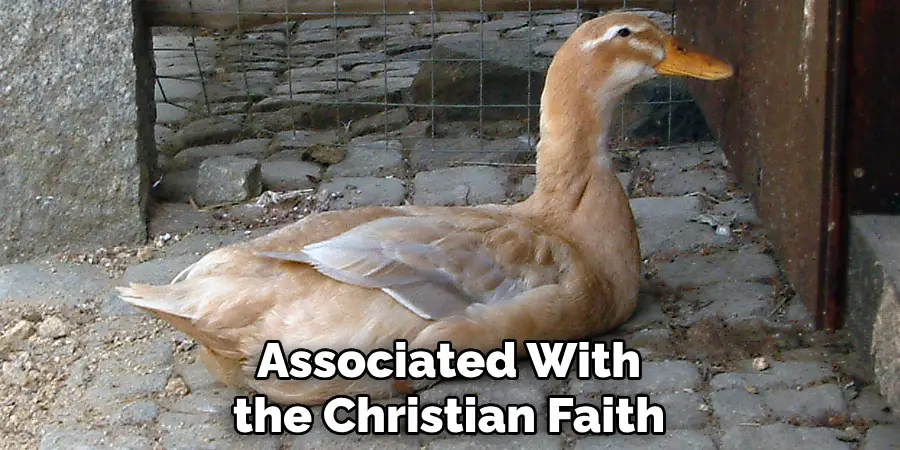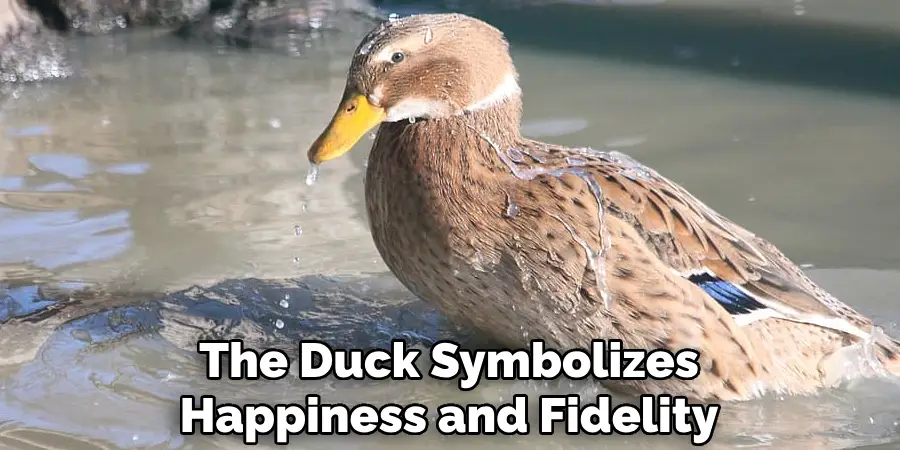Do you wonder about the spiritual significance of animals? If so, have you ever considered looking into Saxony Ducks? They are beautiful birds with a fascinating story to tell. People from all over the world have wondered what spiritual meanings may lie within these stunning creatures. In this blog post, we will explore the saxony spiritual meaning that might bring a deeper understanding of your own life and journey. We’ll look at their natural behavior and the many traditional beliefs surrounding them. By delving into the symbolic qualities of these inspiring critters, there is much to learn about how our environmental behaviors affect our innermost selves and how our inner experience spills over into outwardly noticeable actions.

Saxony Duck Symbolism and Meaning
Saxony Duck Native American Symbolism
The Saxony duck holds a fascinating place in Native American symbolism. Many indigenous cultures across North America saw These striking birds as a symbol of grace, agility, and freedom. For some tribes, the Saxony duck represented the ability to adapt to changing environments, a crucial skill for survival in the harsh wilderness.
Others viewed the duck as a messenger between the physical and spiritual worlds, a mediator between humanity and the divine. Whatever their interpretation, it’s clear that this magnificent bird held a special place in Native American culture, inspiring wonder, respect, and admiration for centuries.
Saxony Duck Eastern Symbolism
The Saxony duck may not be as well-known as other duck breeds, but it holds a special place in Eastern symbolism. The Saxony duck symbolizes abundance, good fortune, and prosperity in many Eastern cultures with its deep, rich coloring and distinctive plumage.
According to ancient folklore, seeing a Saxony duck in flight is a sign of impending prosperity and good luck, while keeping one as a pet or raising them for their meat is considered a surefire way to attract positive energy and abundance into one’s life. In short, the Saxony duck is more than just a beautiful bird – it’s a harbinger of prosperity and good fortune for those who pay attention to its Eastern symbolism.
Saxony Duck Christianity Symbolism
Saxony ducks have long been associated with the Christian faith. These birds have unique markings on their feathers that are said to represent the Holy Trinity: the Father, Son, and Holy Spirit. Additionally, their habit of swimming underwater is believed to symbolize the act of baptism, which is an important ritual in Christianity.

The Saxony duck’s importance in Christian symbolism is not well-known, but for those who appreciate the beauty of these birds, it is fascinating to consider the significance they may hold in religious iconography. Whether you are a believer or not, it is clear that the Saxony duck has a special place in the hearts of many who admire their graceful form and striking plumage.
Saxony Duck Celtic Symbolism
Saxony Ducks may seem like ordinary birds, but hold a special place in Celtic symbolism. In Celtic lore, waterfowl were seen as messengers from other realms and were believed to have a connection to the spirit world. This is why the Saxony Duck is particularly important, as its coloring and feather patterns closely resemble the triskelion, a popular Celtic symbol.
The triskelion represents the three realms – land, sea, and sky – as well as the cycle of birth, death, and rebirth. It’s fascinating to think these small ducks could have such significant meaning in ancient Celtic traditions.
Saxony Duck African Symbolism
The Saxony Duck may not be the first animal that comes to mind when thinking about African symbolism, but its unique history tells a fascinating story. Originally bred in the 1930s in Germany, the Saxony Duck was created by mixing Rouen, German Pekin, and Blue Pomeranian ducks. Despite its European roots, this breed has become associated with African symbolism due to its distinct coloring.
The Saxony Duck’s blue-gray feathers have been interpreted as representing the color of the sky and the water – both important elements in African cultures. Additionally, the duck’s calm and serene disposition has been likened to the peace and tranquility often associated with African spirituality. In this way, the Saxony Duck has become a symbol of harmony and balance in African culture.
Saxony Spiritual Meaning
The Saxony duck is a beautiful and rare breed of domesticated waterfowl that boasts heavenly hues of rich brown, creamy white, and striking blue. But these majestic birds also hold significant spiritual meaning beyond their physical prowess. In many cultures, ducks are revered for their connection to the divine; they often symbolize transformation, grace, and spiritual awakening.

The Saxony duck, in particular, is said to embody the qualities of protection, intuition, and manifestation. Whether you raise Saxony ducks yourself or simply observe their grace from afar, these spiritual creatures offer a profound reminder to honor and embrace the spiritual aspects of life.
Saxony Duck in Dreams
Have you ever dreamt of a Saxony duck? These beautiful birds are known for their striking appearance, with vibrant feathers that shimmer under the sunlight. In dreams, they can symbolize a sense of tranquility and peace as they float gracefully on water with a calming presence. Perhaps your subconscious mind is trying to tell you to find balance in your waking life, or to let go of any stresses that may be weighing you down. Either way, encountering a Saxony duck in your dreams can be a unique and memorable experience that leaves you feeling refreshed and renewed upon waking.
Saxony Duck Encounters and Omens
Saxony ducks have often been known to symbolize good fortune, but some believe encountering these birds can also serve as an omen. Legends suggest that those who witness a group of Saxony ducks flying overhead will soon receive an unexpected windfall of good luck. However, others believe that coming across a lone Saxony duck might signify bad news.
Despite these superstitions, Saxony ducks are beloved by many for their striking appearance and delightful personalities. Whether considered heralds of good or bad fortune, there’s no denying that seeing a Saxony duck is an exciting and memorable experience.
Saxony Duck’s Meaning in Mythology and Folklore
Ducks have played a significant role in various cultures worldwide throughout mythology and folklore. The Saxony duck, in particular, has a unique meaning in mythology and folklore. In Chinese culture, the duck symbolizes happiness and fidelity, while in Norse mythology, the Saxony duck represents the goddess Freya.

Additionally, in the West, the Saxony duck is often associated with winter and holiday celebrations. With its attractive plumage and charming demeanor, it’s no wonder this duck has captured the hearts and imaginations of people across the globe. Whether you’re a fan of folklore or just a nature enthusiast, exploring the cultural significance of the Saxony duck is undoubtedly a fascinating journey.
Saxony Duck Totem Animal
The Saxony Duck is a totem animal full of vibrant energy and a spirit of grace. As a symbol, the Saxony Duck represents balance and renewal. Its characteristic waddle evokes a sense of serenity and calmness, reminding us to take life slower. With its gorgeous blue, black, and white feathers, the Saxony Duck is easily recognizable and inspires feelings of simplicity and contentment.
The presence of a Saxony Duck as your totem is an invitation to live freely, purely, and in the present moment. As you encounter this totem animal, let it guide you towards letting go of stresses, settling into yourself, and accepting the beauty of this world around you.
Saxony Duck Tattoo Meaning
The Saxony duck is a breed of domesticated duck that is known for its distinctive looks and endearing personality. While these ducks may be wonderful companions for those who keep them as pets, they have also become a popular subject for tattoos. The Saxony duck tattoo design can hold a variety of meanings, depending on the individual who chooses to get it.
For some, the tattoo may represent a love of nature or a connection to the outdoors. The Saxony duck may symbolize joy, innocence, or freedom for others. Whatever the motive behind the tattoo, these feathered friends are undoubtedly beautiful and charming.
Saxony Duck Spirit Animal
The Saxony duck, a stunning waterbird in buff, blue, and burgundy colors, has been revered as a spirit animal known for its grace, beauty, and unwavering determination. In Native American culture, it was believed that encountering the Saxony duck served as a reminder to stay focused on their goals and dreams.

This sentiment holds true today, as the Saxony duck symbolizes resilience and perseverance in overcoming obstacles. As you observe this regal creature, take inspiration from its calm and collected nature and trust in the journey ahead. The Saxony duck reminds us that we can achieve anything we set our minds to with patience and persistence.
Conclusion
It is clear that the Saxony Duck has its spiritual meaning, and the ducks often remind us to keep our spirit alive in every moment. They softly quack their way to loving reminders that we have choices in any given situation and that even the most difficult moments can pass with faith. With this reminder of living our life fully and faithfully, take a moment today and look around you in your environment, be it nature or your home (virtual if that works!).
Witness the beauty of this moment, cherishing your journey. You are capable of more than you know. Believe in yourself, and you will go far! Let’s make yesterday’s dreams a reality! Go forth full of enthusiasm and joy — may the good vibes give you wings so you can fly! Thanks for reading our post about the saxony spiritual meaning.
You Can Check It Out to Hardhead Spiritual Meaning, Symbolism and Totem
